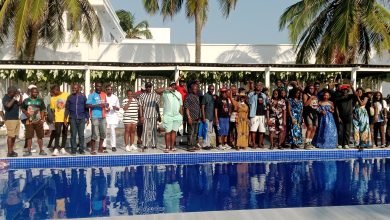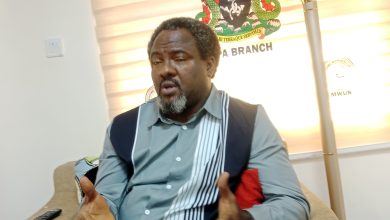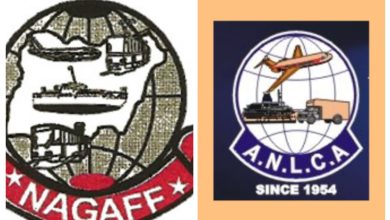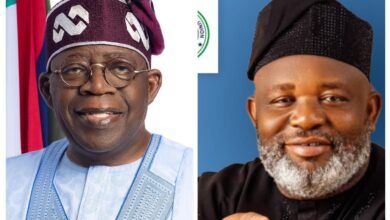FG Unveils Port Rehabilitation, Shipping Reforms to Boost Blue Economy
FG Unveils Port Rehabilitation, Shipping Reforms to Boost Blue Economy
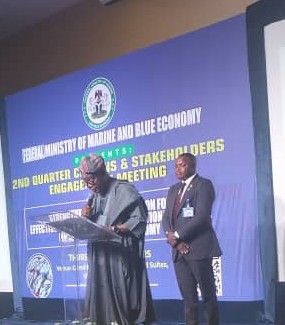
Hope Ejairu
In a bid to enhance Nigeria’s Marine and Blue Economy, the Federal Government (FG) has introduced comprehensive strategies for ports rehabilitation and shipping industry reforms.
The Minister of Marine and Blue Economy, Mr. Adegboyega Oyetola, disclosed this during a one-day Citizens/Stakeholders’ Engagement held at Eko Hotels and Suites, Victoria Island, Lagos, on Thursday, July 3, 2025.
The event, themed “Strengthening Collaboration for Effective Implementation of the National Policy on Marine and Blue Economy”, brought together a wide range of participants, including maritime stakeholders, government representatives, civil society groups, and business leaders to discuss practical steps for executing the newly approved policy framework.
In his keynote address, Minister Oyetola described the National Policy on Marine and Blue Economy as a groundbreaking initiative aimed at unlocking the full potential of Nigeria’s maritime resources. This includes investments in port modernisation, local shipping capacity, aquaculture development, marine innovation, clean energy, ocean governance, and coastal tourism.
“The approval of this policy by the Federal Executive Council (FEC) is a turning point for our sector. Our task now is to drive implementation with clarity, urgency, and collaboration,” he said.
He revealed that contracts had been approved for the complete overhaul of the Apapa and Tin Can Island Ports under the Western Port Rehabilitation Programme, while procurement processes were in progress for similar upgrades in the Eastern Ports.
According to the Minister, these physical improvements will be supported by digital tools such as the Port Community System, E-Call Up System, and a streamlined One-Stop-Shop clearance platform, all designed to reduce operational delays and enhance port efficiency.
With reference to shipping development, Minister Oyetola announced ongoing plans to establish a national carrier through a Public-Private Partnership (PPP) model, and affirmed that the Nigerian Maritime Administration and Safety Agency (NIMASA) has commenced initial steps toward the long-awaited disbursement of the Cabotage Vessel Financing Fund (CVFF).
He assured that the process will be guided by transparency and compliance with regulations, stressing that “building indigenous shipping capacity is critical to our goal of positioning Nigeria as the maritime hub for the West and Central Africa.”
The Minister highlighted the Ministry’s recent achievements, including upgrades in digital adoption, improvements in revenue generation across maritime agencies, and the removal of trade-related regulatory barriers.
He emphasised Nigeria’s increasing influence in the regional maritime landscape, citing the country’s leadership in setting up the Regional Maritime Development Bank under the Maritime Organisation of West and Central Africa (MOWCA).
Oyetola noted that Abuja has been confirmed as the headquarters for the new institution and pointed out that, in relation to inland water transport, the Ministry, through the National Inland Waterways Authority (NIWA), has distributed more than 42,000 life jackets nationwide, deployed ferries and patrol boats, as well as implemented safety measures that have led to reduction in water transport-related accidents.
The former Osun State governor announced plans to scale up investments in fishery terminals, automate licensing systems, and expand aquaculture production to support food security and rural economies.
Speaking further, he outlined the successes recorded in Nigeria’s maritime security, including recording zero piracy incidents in three successive years, acknowledging the impact of the Deep Blue Project.
The Minister revealed Nigeria’s formal candidacy for a Category “C” seat on the International Maritime Organisation (IMO) Council, with the aim of strengthening the country’s influence in international maritime policy.
“Our transition to a sustainable blue economy will not happen automatically. It will take innovation, investment, and strong partnerships,” he remarked.
He further urged stakeholders to partner and contribute meaningfully to the ongoing implementation process, and expressed gratitude for their contributions to marine development and economic growth.
The event also provided an opportunity for stakeholders’ input, including presentations by KPMG and the Presidential Aide on Policy and Coordination, as well as goodwill messages from the Nigeria Customs Service (NCS), the National Association of Government Approved Freight Forwarders (NAGAFF), APM Terminals, the Nigerian Navy, among others.




